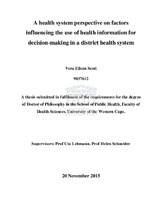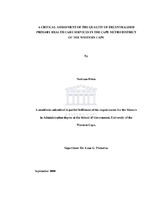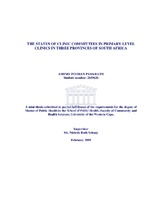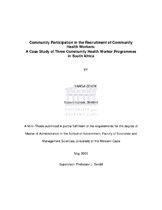A health system perspective on factors influencing the use of health information for decision-making in a district health system
Abstract
This research explores a poorly understood area of health systems: the nature of managerial decision-making in primary healthcare facilities, and the information that informs decision-making at this level. Located in the emerging field of Health Policy and System Research, this research draws on constructivist and participatory perspectives to understand the role of information and, more broadly, learning and knowledge in decisions that primary healthcare managers make, and the systemic factors influencing this. Using a multiple case study design with iterative cycles of in-depth data collection and analysis over a three year period, it examined the decision-making and information use in three cases of managerial responsibility in 17 primary healthcare facilities in a sub-district in Cape Town. The cases were: improving efficiency of service delivery, implementing programme priorities and managing leave of absence. Using multiple strategies for engaging primary healthcare facility managers, often as co-researchers of their own practice, the research sought to elicit both their explicit and tacit, experience-based knowledge on these phenomena. Key insights gained in the research are that firstly, operational health management at facility level is less linear and simple than policy-makers and planners often assume, and is, instead, characterised by considerable on-the-spot problem solving and people management to meet multiple agendas, which can be surprisingly complex. Secondly, contrary to prevailing views, managers do actively use information in decision-making, but require a wide range of information which is outside of the current, and indeed the globally-advocated, health information system (HIS). Thirdly, they not only use, but generate, information in their management routines and practices, and must learn from experience in order to adapt new interventions for successful implementation in their facilities and communities. This research thus makes explicit the value and use of informal information and knowledge in decision-making. It demonstrates, amongst others, a relationship of functional interdependence between the use of formal information in the HIS, and informal information and knowledge, suggesting that the latter has the potential to improve the use and utility of formal health information by making sense of it within the local context. Furthermore, building on the public policy literature on governance, this research develops a model to understand the multiple contextual influences on decision-making and information use, showing the central role of values and relationships across the health system. It proposes a causal mechanism for strengthening the use of information in decision-making. Finally, in giving priority to the informational needs of facility managers, this research offers a bottom-up perspective which argues for an integrated approach to health system strengthening which moves beyond atomised treatment of HIS strengthening. It suggests the need to re-think how to support facility managers by re-positioning the HIS relative to organisational learning, and leadership and management development.
Related items
Showing items related by title, author, creator and subject.
-
A critical assessment of the quality of decentralised primary health care services in the cape metro district of the Western Cape
Peton, Neshaan (2009)The complex and multi-facet decentralisation process of Primary Health Care services in the Cape Metro District of the Western Cape will be critically assessed in this thesis. Primary Health Care is the provision of ... -
The status of clinic committees in primary level clinics in three provinces in South Africa
Padarath, Ashnie Pooran (University of the Western Cape, 2009)In South Africa, governance structures in the form of clinic committees, hospital boards and district health councils are intended to provide expression to the principle of community participation at a local and district ... -
Community participation in the recruitment of community health workers: a case study of the three community health worker programmes in South Africa
Zembe, Yanga (University of the Western Cape, 2009)This research investigates the nature and extent of community participation and involvement in the recruitment and selection processes for Community Health Workers (CHWs), primarily through detailed case studies of three ...




